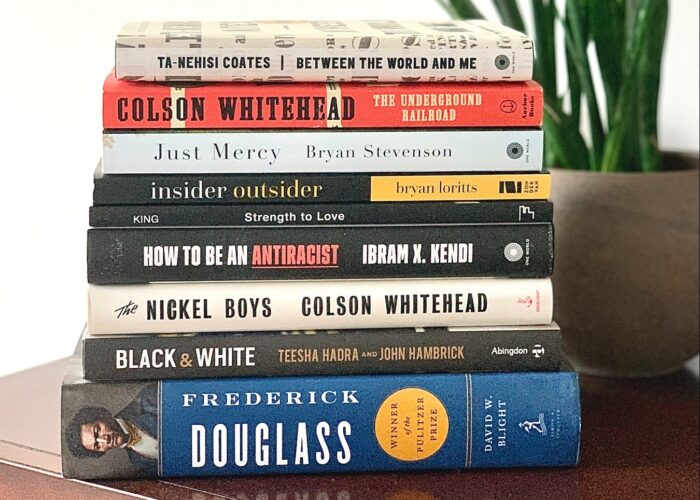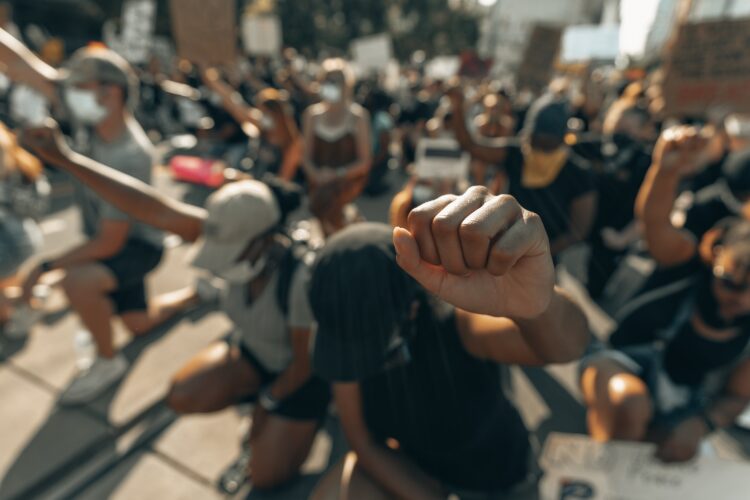A little Essay for a Friend on Critical Race Theory and the 1619 Project
Two great interpretations of America from the radical left culture formation influencers are constantly in the news, one is The 1619 Project and the other is Critical Race Theory. The two are logically distinct but work together and have overlapping content.
The first, The 1619 Project argues that America was born and built on slavery. This project is not about the treatment of Native Americans in American history which is a scandal for which only total repentance and restitution can somewhat mitigate the terrible injustice, but nothing can ever be enough for the sin. Healing can be found in the Gospel. The 1619 Project says that American history began with slavery and then, amazingly, that the Revolutionary War was fought to maintain slavery. This is a strange claim since the British were not opposing slavery at that time, but many from the Northern Colonies like John Adams were very anti-slavery. It could be said that an independent America would be more a danger to the slave owners. However, the Constitution enshrined states’ rights at a level where slavery was secure for the states that wanted to practice it, south of what was known as the Mason Dixon Line. Because some northern people owned slaves, it is claimed that the whole society was built on slavery. This is not true, but the North was in part built by indentured servants who gained passage from the United Kingdom through indentured servitude, and they were very abused. The problem with The 1619 Project is that it evaluates America totally through the lens of slavery for which America paid a huge price in the Civil war. In my view, the project is bad history since it oversimplifies a very complex battle between rapacious greed (the Kingdom of darkness) and the Kingdom of God. This has always been the struggle in the United States. One can read Howard Zinn’s Neo-Marxist People’s History of the United States and compare it with the Patriots History of the United States, which opposes Zinn, to get a good idea of two different approaches. The second does not sugarcoat the great sin of slavery.
I think no one has written an adequate history from Biblical norms though there is a Christian history in print that was used in conservative Christian schools and homeschooling. A true Bible-based history would look at how the Kingdom of God influenced and intersected in the history of the United States along with the kingdom of darkness and its greed and evil. Also, the key figures of influence Christians in bettering life in the United States needs to be part of this. This is mostly ignored by secular historians. Some who were Post-millennialists like Jonathan Blanchard, the founder of Wheaton College, who was a great abolitionist and supported the underground railway for escaped slaves, and the great revivalist Charles Finney, believed that the government and laws of the United States could be brought into conformity to the Law of God and demonstrate a Kingdom of God civil order. This was a common view from the Puritans in the 17th century and prevailed until the beginning of the 20th century. Not all were Post-millennialists, but it was a common view that Christians were to work to bring the nation into conformity to the will of God as expressed in his Law.
When I speak about Kingdom influence, I speak about those who fostered Kingdom values even if they were not committed Christians due to the influence of the Bible in the Western World and upon their values.
The clash of Kingdoms can be seen even in one person. One can read great biographies, like Flexner’s of George Washington, or McCollough’s of John Adams to gain more insight. For example, Washington was a man of incredible character and worked hard to develop his Christian character. Yet he did not free his slaves during his lifetime though he was conflicted about it. When Washington had the power and popularity to become the King he instead retired after two terms for the good of the nation. On the other hand, Washington sought to gain great land possessions and wealth at the expense of the Native Americans and the lower white classes who were closed out of farm ownership. The Pilgrims and Puritans sought a new order of civil government based on Biblical norms as they fought for their right to Christian liberty. Yet, Puritans did not allow for decenters but required conformity to their doctrine and polity. After a few decades, they also mistreated Native Americans. They built a great society but then ended in the great injustice and hysteria of the Salem Witch Trials. It would be left to Roger Williams, a Baptist, to create freedom of conscience in religious matters in Rhode Island. With regard to native Americans, one finds those who treated them well and genuinely cared, such as David Brainard, the son-in-law of the great Jonathan Edwards. However, in general, those who cared about the Native Americans were the minority and did not prevail.
While the Pilgrims and Puritans came to the Colonies to practice a more pure Christianity, the Virginia settlers and those after in the South were motived by financial opportunity. Slavery greatly increased their ability to gain wealth. Again we see the influence of the Kingdom of Darkness.
The Revolutionary War was fought over unjust government and the unnaturalness of being ruled from across the sea. Was it justified? It can be debated. One can read the founders’ own words about their motives and what they wanted to build. Preserving slavery was not the motive of most. Yet, the South that was building an economy based on slavery, did have motives to see that the profits from slavery would not be compromised by the British government rule. When the Constitution was written, the issue of slavery was a hot one. One cannot see the Constitution as a document fostering slavery. The compromise on representation in the House of Representatives was that the Negro would count as 3/5 in the population count for apportioning representation. The North would not let them count for more southern representatives if they could not vote and did not have full citizenship and liberty. The south wanted to count them so they would have more power but would not give them representation. The 3/5 rule was to mitigate the power of the South due to its slavery system. It was not saying that the Negro was 3/5 of a man as some have falsely argued. This battle for and against slavery continued throughout the years before the Civil War, with those like John Quincy Adams, son of John Adams, fighting against slavery and others like Senator Calhoun fighting for it. Compromises were made so the nation would not break apart. To see the United States as just based on slavery, is really such a simplistic slander. Rather it was a nation in strife over this institution, with many Evangelicals in the forefront seeking its abolition.
So, one finds a nation always in conflict but with a greater Kingdom of God influence on it than perhaps any other nation on Earth. Maybe this was also true of Britain in revivals. In the Declaration of Independence, we read that “All man (human beings) are created equal” and are endowed with rights from the Creator. This statement is only possible from the Biblical influence of the doctrine that all people are created in the Image of God. The Declaration and Constitution require the consent of the governed. There is great antipathy to the concentration of power in a King or a few. Checks and balances and decentralization of power through both the separation of powers, legislative, judicial, and executive, plus the power of state governments was to prevent tyranny. This is again an orientation in accord with Kingdom values which notes well the danger of unbridled political power. The separation of the Church government from the civil government was not intended to say that the civil government was not accountable to God and his law. Most state constitutions acknowledged that accountability. Yet despite all this decentralization, the nation developed in ways that empowered its own oligarchy who found ways to gain wealth and political control at the expense of the ordinary citizens. When labor was exploited, it was not only Communists that fought for labor rights but Christians who fought against child labor and for fair wages for the workers. The development of unions mitigated labor exploitation, preventing a tyranny of power in a Communist dictatorship. The United States developed an extraordinary ability to absorb immigrants and to see upward mobility toward prosperity never before seen in any other nation. My ancestors from Romania and Norway were examples of such ability to succeed. Never has a nation produced such prosperity for so many. Yet, a poor and exploited underclass was a continuing problem. The Church was called to identify with the poor but often failed and ministered instead to the more successful.
Though a Civil War was fought, slavery abolished, and new Congressmen and Senators were elected from the Black citizens of the South, within a generation the Federal government caved to political pressures, and Jim Crow segregation was accepted for the next 80 years.
Never was a country formed on higher principles that were consistent with biblical values. It was a nation to be based on common values, not on ethnicity, tribe, or old European national identities. All men were created equal and on the basis of the new vision, it was “Out of Many One.” There was unprecedented freedom to spread the Gospel. Only the United States allowed hard money to be shipped overseas to support missions without limit. The idea was that the state had no business regulating the Church which was a divine sphere. Hence the greatest missions movement in history spread from the United States to the nations. Was this freedom for the Gospel one of the reasons for the prosperity of the nation?
Yet again the forces of greed gained in the rapacious monopolists who exploited their workers as near slave levels, but then were reigned in by Theodore Roosevelt, the great fighter against monopolies. The United States spread the vision of freedom to the world, checks, and balances, and constitutional government at the same time its corporations exploited less-developed nations.
Today as the Church is in decline through compromise and worldliness, the United States is the greatest exporter of pornography. Criminals exploit women with prostitution, human trafficking, and almost insane ideas that have gained currency like gender fluidity, trans-genderism, and homosexual marriage. Part of the Church is tempted to compromise and get behind the cultural trends. Can there be a revival or will the United States head for judgment?
We should close this article on one more battle. It is the issue of the condition of the black underclass. Since the civil rights movement, many blacks have made great gains, but others remain in poverty in much higher numbers than their proportion as citizens. Crime and murder in the inner cities, inadequate policing in number and quality is endemic. From the promise of civil rights came the disappointment of continued failure. Racism still exists, but liberal programs have produced dependency and added to the destruction of the black family and more poverty. Public unionized schools, some with great per pupil funding, totally fail the students and graduate those who cannot even read. The response is to claim that “abelism” is racism. Hence their failure is not really failure.
Today there is a dangerous concentration of wealth in the hands of a few. Such obscene wealth concentration contradicts the idea of the decentralization of power since this wealth brings frightening power for the control of others. Witness social media for an example. This is a great danger since with such power speech is controlled in media and there is an ability as well to enforce their view on the population, a kind of social engineering. The new direction is a type of oligarchic corporate socialism.
The question is, will revival bring gain? There have always been three approaches to the relationship of Christians to government and social formation. Great Christians have argued for all three positions. One is the quietist approach of the Peace Churches (Mennonites, Amish, Peace Brethren) that have no hope for any attainment of godliness outside of the Church in this life. They produce a counter-culture and do not engage the larger culture. The Dispensationalist Fundamentalists also were part of this first response. For them, since this earth is a sinking ship, the goal is to get people into the lifeboat so they can go to heaven or be taken out (raptured) before the Great Tribulation.
The second view is that of the zealous Post-millennialists who believed that Christians were to take over the whole world and rule it before the return of Jesus. Charles Finney and Jonathan Blanchard were great examples of this fervent faith. Their colleges, Oberlin and Wheaton were founded for this goal. It became the dominant post-Civil War Evangelical view. It died out with World War I.
Then finally is the third, the classic Reformed view. Influencing society toward greater justice and righteousness in all spheres was part of Christian witness. We are to “occupy until he comes” and to care about all the spheres of human life, making a better world for our generation even if in the future the Antichrist will come to power. I fit into this category, but when the culture is too far gone, I recognize the Mennonite option. Indeed, even in this third option, we are to know that good and evil will continue to battle until He returns. Those in this view know we cannot idolize any nation, but patriotism and loyalty must be secondary by far to the Kingdom of God. The best of nations will show good but also great evil.
My purpose in this essay is to steer clear of both the idolization of America as if it is the chosen and righteous nation and the other view, to see America as only the nation of exploitation and evil as in The 1619 Project and mostly in Zinn’s history text. They can write history as a catalog of the sins of the nation and that catalog is based on real evils. The proper understanding of the history of the United States is a great saga of the battle of the Kingdom of Light and Darkness. And both are present in great degree. Demonizing the United States will bring division and not progress and healing. Idolatry will also have the same negative effect. Loyalty to America is based on fostering Kingdom values. A Christian should reject both the demonization and the idolization and be salt and light, a balanced patriot fostering Kingdom values in the nation.
Part two will continue with Critical Race Theory









